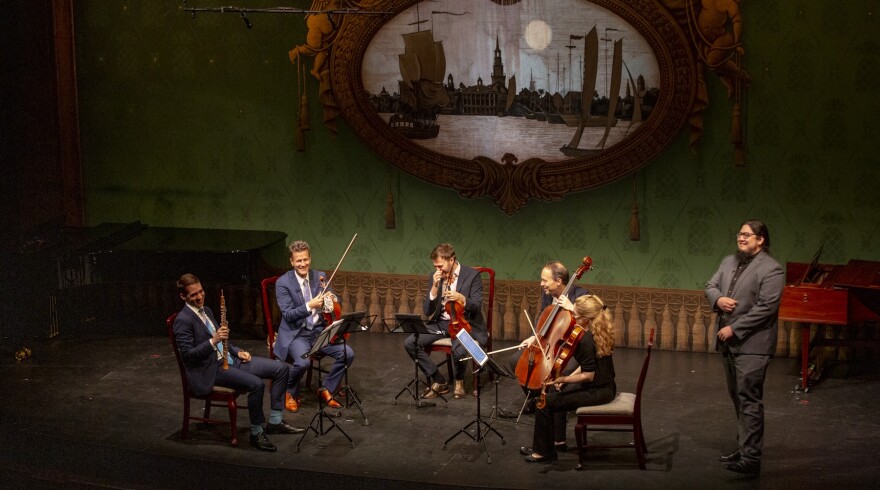Paul Wiancko started playing cello at age five. By age eight, he had composed his first piece of music.
“If you can call it a piece,” Wiancko says. “I think it was maybe a thirty-two measure little tune, mostly in C major, mostly consisting of a couple of triads. And I believe it was called “Breeze.” I had one of my parents’ friends print out the sheet music for it."
But for a long time following that early effort, Wiancko would shift his musical talents elsewhere.
“After that I took about a twenty-year hiatus from composing,” Wiancko says, recalling how he converted his college dorm room into a soundproofed recording studio while pursuing a cello performance degree. At the same time he was learning the major works of the classical cello repertoire, Wiancko was collaborating with musicians from an array of other genres.
“I think one year I went to Poland for this cello competition--theLutosławski competition--and ended up playing the Lutosławski concerto with the Polish Radio Symphony there. And when I came home a few days after that, I had some recording sessions for a local punk band in my dorm room. So it was like a stellar month for me.”
That memorable, musically-diverse month came to foreshadow his career as a composer.
“Can this be my life?” Wiancko remembers asking himself not long after. “Get to play Lutosławski and record with punk bands? It’s the greatest thing ever. So I’ve tried to sort of carry that sensibility with me wherever I can.”
That sensibility entails finding inspiration in musical figures as diverse as György Ligeti, Henri Dutilleux, The Bad Plus jazz trio, and pianist Chick Corea.
Indeed, Wiancko’s wide-ranging approach was evident in the works he brought to this year’s Spoleto Festival USA Chamber Music Series as its composer-in-residence. Wiancko describes one of them, a cello quartet called When the Night (2017), as a lullaby that incorporates soul, R&B, and jazzy elements. An important, recurring motif in the quartet alludes to the first three notes of Ben E. King’s “Stand By Me”--hence its title.
Wiancko’s Closed Universe (2016) was also performed as part of the series. Written for five performers, the work requires the standard forces of a piano quartet as well as the presence of a second cellist who can double on glockenspiel. For the Spoleto performances of Closed Universe, the composer himself filled that dual role.
Wiancko says the work came in the midst of a worrisome news addiction that made it hard for him to focus on composing.
“I felt like I was trapped in this little universe. Just wanted to read headlines all day long.”
Though he found it difficult, Wiancko was able to manage his media consumption and complete the piece.
“It’s sort of an attempt to find some beauty and some peace within this very small world,” Wiancko says of the work. “To be able to find joy when you can, where you can, in the conditions that you can is sort of the theme of the piece. And with the glockenspiel, there are definitely some Disney princess moments in this piece. I’m not ashamed to say that these moments did bring me great joy when writing them.”
The chamber music series also featured the world premiere of Wiancko’s oboe quintet Faults (2019), written for festival regulars James Austin Smith and the St. Lawrence String Quartet. It was through Smith, his friend, that Wiancko became composer-in-residence of the series.
“[Smith] heard the Aizuri Quartet perform my piece Lift a year or two ago. He got it in his mind that he wanted an oboe piece from me, and he said ‘I have these four quartet musicians that are friends of mine and I’ll run it by them and see if they want to make a quintet with me.’”
It was a dream come true for Wiancko. “When I found out that he was talking about the St. Lawrence Quartet--yeah, I flipped out,” he says. “I’ve been listening to their records since I was a little kid.”
According to the composer, the pressure he felt writing for the quartet was nothing extraordinary.
“Anytime you write a note that anyone else is going to play there’s an inherent pressure to make it good. For me the pressure is more of a general--maybe it’s sort of an existential--issue to just write honestly and for my music to be as direct a connection as possible to how I’m feeling. It’s a tricky thing, I think, for any composer.”
Wiancko’s works can be heard as part of the 2019 Spoleto Festival USA Chamber Music Series broadcasts on South Carolina Public Radio beginning Friday, May 31st, at 10am.




